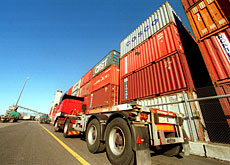
IMF calls on Swiss to adopt EU product policy

The International Monetary Fund says the Swiss economy is performing well but it warns the authorities to avoid complacency.
In its annual assessment, the IMF comments that as economic expansion enters its fourth year “growth is balanced, inflation is low and employment is strong”.
It argues for “deeper structural reform” in the internal market, such as adopting the “Cassis de Dijon” principle although it is not a member of European Union.
Under this principle, a product legally manufactured in one EU state may circulate freely in another.
In its report released on Monday, the IMF said adoption of the ruling would strengthen domestic demand and make a contribution, appropriate for Switzerland’s size, to the reduction of global imbalances.
The government came out in favour of the “Cassis de Dijon” principle last year, but parliament still has to decide on the issue.
The IMF adds with a “positive” outlook for 2007, it expects growth of GDP of two per cent. This is in line with the forecast of the Swiss National Bank but slightly higher than the government’s own estimation of 1.7 per cent growth.
Economists from the IMF recommend the Swiss to take a closer look at the factors generating the country’s current account surplus, which it describes as “very strong”.
Banking supervision
They say currency weakness, Switzerland’s large stock of net foreign assets, and its position as an international financial centre and provider of wealth management services, could be playing a role.
The IMF noted that the financial sector was performing well and banking supervision had been strengthened. But it said one area that required attention was overseeing liquidity.
Given the complex nature of the banks and their systemic importance, continuing efforts should be made to evaluate regularly their evolving risk exposures and complex operating models, it said.
Turning to fiscal matters, the IMF commented that the government’s debt brake had worked well but warned that additional measures were needed. It noted that it covered the federal budget but not the growth in social security entitlements.
While welcoming the fact that the retirement age for women will rise to 65 by 2009, the IMF felt that the retirement age for men and women should be raised further in view of increased life expectancy.
A senior finance ministry official, Peter Siegenthaler, said the main message from the IMF seemed to be that Switzerland should be aware of all the risks even in good times.
swissinfo with agencies
Switzerland has been a member of the World Bank and the International Monetary Fund since 1992.
Switzerland sits on the executive boards of both institutions and leads a voting group that includes Azerbaijan, Uzbekistan, Kyrgyzstan, Poland, Serbia, Tajikistan and Turkmenistan.
The World Bank provides loans, technical assistance and institutional advice, while the IMF promotes monetary cooperation, financial stability and crisis prevention.
In its annual report published on Monday, the government said its efforts this year would be concentrated on economic growth.
It said structural economic growth was among the lowest in Europe and members of the Organisation for Economic Cooperation and Development (OECD).
It added that mid- and long-term economic growth prospects were unsatisfactory.
The government noted that the Swiss economy grew by 2.7% last year. Unemployment fell to 3.1%.

In compliance with the JTI standards
More: SWI swissinfo.ch certified by the Journalism Trust Initiative

















![The four-metre-long painting "Sonntag der Bergbauern" [Sunday of the Mountain Farmers, 1923-24/26] had to be removed by a crane from the German Chancellery in Berlin for the exhibition in Bern.](https://www.swissinfo.ch/content/wp-content/uploads/sites/13/2025/12/01_Pressebild_KirchnerxKirchner.jpg?ver=a45b19f3)












You can find an overview of ongoing debates with our journalists here . Please join us!
If you want to start a conversation about a topic raised in this article or want to report factual errors, email us at english@swissinfo.ch.